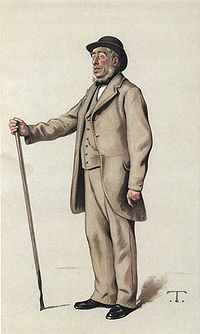
John Bennet Lawes
Encyclopedia

Royal Society
The Royal Society of London for Improving Natural Knowledge, known simply as the Royal Society, is a learned society for science, and is possibly the oldest such society in existence. Founded in November 1660, it was granted a Royal Charter by King Charles II as the "Royal Society of London"...
(28 December 1814–31 August 1900) was an English
England
England is a country that is part of the United Kingdom. It shares land borders with Scotland to the north and Wales to the west; the Irish Sea is to the north west, the Celtic Sea to the south west, with the North Sea to the east and the English Channel to the south separating it from continental...
entrepreneur and agricultural
Agriculture
Agriculture is the cultivation of animals, plants, fungi and other life forms for food, fiber, and other products used to sustain life. Agriculture was the key implement in the rise of sedentary human civilization, whereby farming of domesticated species created food surpluses that nurtured the...
scientist. He founded an experimental farm at Rothamsted, where he developed a superphosphate that would mark the beginnings of the chemical fertilizer industry.
John Bennet Lawes was born at Rothamsted in modern-day Harpenden
Harpenden
Harpenden is a town in Hertfordshire, England.The town's total population is just under 30,000.-Geography and administration:There are two civil parishes: Harpenden and Harpenden Rural....
near St Albans
St Albans
St Albans is a city in southern Hertfordshire, England, around north of central London, which forms the main urban area of the City and District of St Albans. It is a historic market town, and is now a sought-after dormitory town within the London commuter belt...
, Hertfordshire
Hertfordshire
Hertfordshire is a ceremonial and non-metropolitan county in the East region of England. The county town is Hertford.The county is one of the Home Counties and lies inland, bordered by Greater London , Buckinghamshire , Bedfordshire , Cambridgeshire and...
, the only son of John Bennet Lawes, owner of the Rothamsted estate of somewhat more than 1000 acres (4 km²) and lord of the manor of Rothamsted. He was educated at Eton College
Eton College
Eton College, often referred to simply as Eton, is a British independent school for boys aged 13 to 18. It was founded in 1440 by King Henry VI as "The King's College of Our Lady of Eton besides Wyndsor"....
and at Brasenose College, Oxford. Even before leaving Oxford in 1832, Lawes had begun to interest himself in growing various medicinal plants on the Rothamsted estates, which he inherited on his father's death in 1822. About 1837 he began to experiment on the effects of various manures on plants growing in pots, and a year or two later the experiments were extended to crops in the field. One immediate consequence was that in 1842 he patented a manure formed by treating phosphates with sulphuric acid, and thus initiated the artificial manure industry. In the succeeding year he enlisted the services of Joseph Henry Gilbert
Joseph Henry Gilbert
Sir Joseph Henry Gilbert was an English chemist, noteworthy for his long career spent improving the methods of practical agriculture. He was a fellow of the Royal Society.-Life:...
, with whom he carried on for more than half a century those experiments in raising crops and feeding animals which have rendered Rothamsted famous in the eyes of scientific agriculturists all over the world. In 1854 he was elected a Fellow of the Royal Society
Royal Society
The Royal Society of London for Improving Natural Knowledge, known simply as the Royal Society, is a learned society for science, and is possibly the oldest such society in existence. Founded in November 1660, it was granted a Royal Charter by King Charles II as the "Royal Society of London"...
, which in 1867 bestowed a Royal Medal
Royal Medal
The Royal Medal, also known as The Queen's Medal, is a silver-gilt medal awarded each year by the Royal Society, two for "the most important contributions to the advancement of natural knowledge" and one for "distinguished contributions in the applied sciences" made within the Commonwealth of...
on Lawes and Gilbert jointly, and in 1882 he was created a baronet.
In the year before his death Lawes took measures to ensure the continued existence of the Rothamsted experimental farm by setting aside £100,000 for that purpose and constituting the Lawes Agricultural Trust.
In Harpenden, Sir John Lawes School
Sir John Lawes School
Sir John Lawes School is a secondary school located in Harpenden, Hertfordshire, United Kingdom . It is a state-run school for both males and females between the ages of 11 and 18. The school has close links to two other local secondary schools—Roundwood Park School and St...
is named after him

